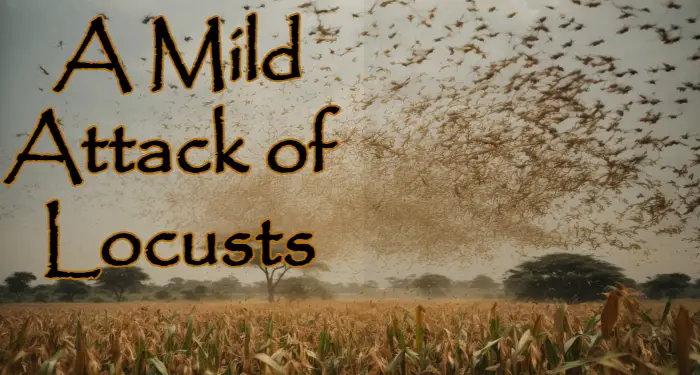“A Mild Attack of Locusts” is a short story by Doris Lessing about a farm that suffers a locust invasion, and the fight to limit the damage. Here’s a summary of “A Mild Attack of Locusts”.
“A Mild Attack of Locusts” Summary
Richard and Margaret live on a three thousand acre maize farm with Richard’s father, Stephen, a farmer from way back. Margaret has lived on the farm three years, and is getting to know how farmers talk about the weather, soil and Government. They make a comfortable living.
The Government has issued a warning that locusts are coming from up North. They come in cycles and it’s been seven years since the last swarm. They make preparations and continue to work as usual. Stephen has been bankrupted twice by locusts.
One day, they see the swarm coming over the mountains. The servants and laborers are summoned and everyone rushes around. The prepared piles of wood and grass are set on fire and the thick smoke rises. There are other fires far in the distance. They get phone calls from neighboring farms warning of the invasion; one has already lost their crop.

Half the sky goes dark as the black cloud of locusts covers the sun. The plan is to make so much noise and smoke that the locusts won’t settle on their land. At Stephen’s urging, Margaret starts making tea to keep everyone going. When she fills large cans with tea, Stephen jogs them down the road to the men.
The locusts hit the roof like hail. Margaret goes outside and is covered with the creatures; she returns to the house. The air is darkening and the trees are weighed down with the swarm. This goes on for hours. Margaret keeps making tea.
Stephen comes back to the house, swearing and covered with the clinging hoppers. The crop is gone. They have to continue, though, to try and prevent the swarm from settling and laying their eggs. Between the swarm and the hoppers from the eggs, the plague will go on for two or three years.
Margaret wonders if they’ll have to go back to town. She realizes Stephen won’t leave, even though he’s old and tired. He removes a locust from his pocket and releases it outside, even though he’s been killing them for hours. Margaret is irrationally cheered by this.
In the meantime, Richard and the other men continue to stoke the fires and bang their metal implements. After having a whiskey, Stephen rejoins the fight. There’s an hour before the sun sets and the locusts settle.
Margaret cries over the hopelessness of country life. The house feels like it will collapse under the storm of invaders. Stephen and Richard return covered with them. The servants go to the compound to rest. The main swarm has moved on. If they don’t get weighed down by rain in the night, the others will leave in the morning. They’ll have some hoppers, but not the main swarm.
There isn’t a single plant or any greenery left on the land. They’ll replant immediately. They talk about the Government’s recommendations for controlling and eliminating the hoppers.
Margaret is restless that night, while Richard sleeps soundly. It’s sunny in the morning. Margaret goes outside with Stephen. The trees shimmer like pale flames as the locusts fan their wings to dry them for flight. Even though they’ve been ruined, it’s a pretty sight. They can also see the main swarm in the distance, heading south.
The remaining locusts fly off, darkening the sky once again, leaving behind bare branches and devastated land. At midday, the African laborers are sweeping up the dead and wounded. Stephen ate sun-dried locusts years ago when he was bankrupted by a swarm.
After lunch, the men start replanting. They need rain soon; there isn’t a blade of grass for the cattle. Margaret thinks about dealing with the next three or four years of locusts, like bad weather. She feels like she’s just survived a war. At supper, the men agree it could have been worse.
I hope this summary of “A Mild Attack of Locusts” by Doris Lessing was helpful.
